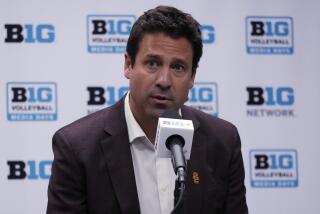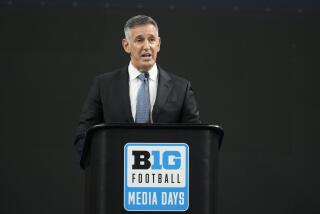Commentary: USC may not be able to escape its Oregon problem in Big Ten after all
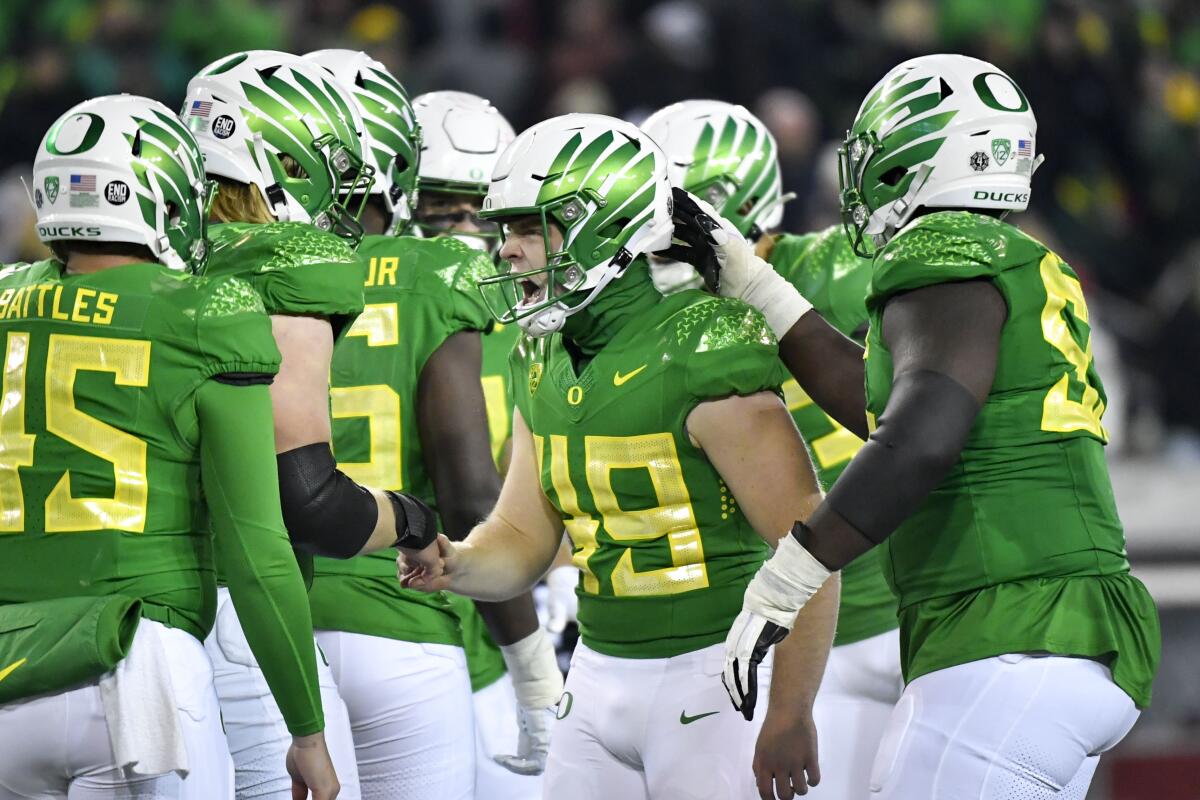
During the past year, USC and UCLA expected they would be the only Pac-12 schools invited to join the Big Ten — that they were the lone West Coast powers selected to elevate the brand of the country’s oldest major college sports conference.
USC and UCLA administrators were led to believe by their peers in the Big Ten that they were special.
And that’s just how USC, in particular, needed this to feel. The Trojans were adamant with the Big Ten that they did not want to be followed to this exciting opportunity by their Pac-12 brethren. They singled out a specific school they found to be most distasteful.
If the Big Ten thought it had to add Stanford or Cal or Washington, USC could probably live with it. But not Oregon. No, no, no. Anybody but the Ducks. That preference, shared by UCLA, was certainly understood, and the L.A. schools hoped it would be honored, a source with knowledge not authorized to speak publicly told The Times.
But Wednesday, a year out from what will be the crosstown rivals’ first official day as Big Ten members, a report from Dan Wetzel at Yahoo Sports threw all of that into question. With the Pac-12 possibly taking its dying breaths, the Big Ten is now considering expanding to 18 with Oregon and Washington or to 20 by adding Stanford and Cal, too.
Reports Thursday suggested that Oregon and Washington are the Big Ten’s focus for now, but that the league would likely wait for a decision from Arizona about joining the Big 12 — a move that appeared more likely by the hour Thursday evening after the Big 12 reportedly approved Arizona’s application.
If the Wildcats exit as expected, bringing the Pac-12 to a Pac-8, the pressure will shift to Arizona State and Utah to join them in the Big 12.
The more unstable the Pac-12’s future becomes, the more comfortable the Big Ten will feel inviting the Ducks and Huskies to join the Trojans and Bruins.
Alarm bells should be ringing throughout Heritage Hall at this possibility. Of course, the Trojans don’t have an athletic director in the building to hear them. But you can bet that Mike Bohn would have reminded new Big Ten commissioner Tony Pettiti of the expectation that had been established with departed commissioner Kevin Warren.
In exactly one year, USC and UCLA will leave the Pac-12 and join the Big Ten. The schools have embraced detailed game plans to help them thrive.
That’s no Ducks! Not ’Sco Ducks!
Oregon has been a pain in USC’s backside for the better part of two decades now and remains so. The Ducks started off plucky under Rich Brooks and Mike Bellotti, but once Phil Knight threw all of his financial weight behind his alma mater’s football team, they soared higher under Chip Kelly than anyone ever thought possible.
When USC fell apart after Pete Carroll left and the NCAA sanctions hit, Oregon stepped in and became the best program in the Pac-12 during the 2010s. It remains the last West Coast team to play for the national title, losing to Ohio State to conclude the 2014 season.
The Ducks under Mario Cristobal came to Southern California to plunder on the recruiting trail during the final years of Clay Helton at USC and succeeded again and again. Under second-year coach Dan Lanning, they remain the most consistent threat to raid the Southland, thanks to an aggressive donor collective that has Knight’s backing, the glossiest football facilities around and, as always, all those slick uniform combos.
USC was enthralled by the Big Ten opportunity for many reasons that we’ve covered here — the money and the exposure, mostly. But Oregon being stuck behind in the Pac-12 would be an undeniable advantage to the Trojans as they try to ascend back to prominence under Lincoln Riley.
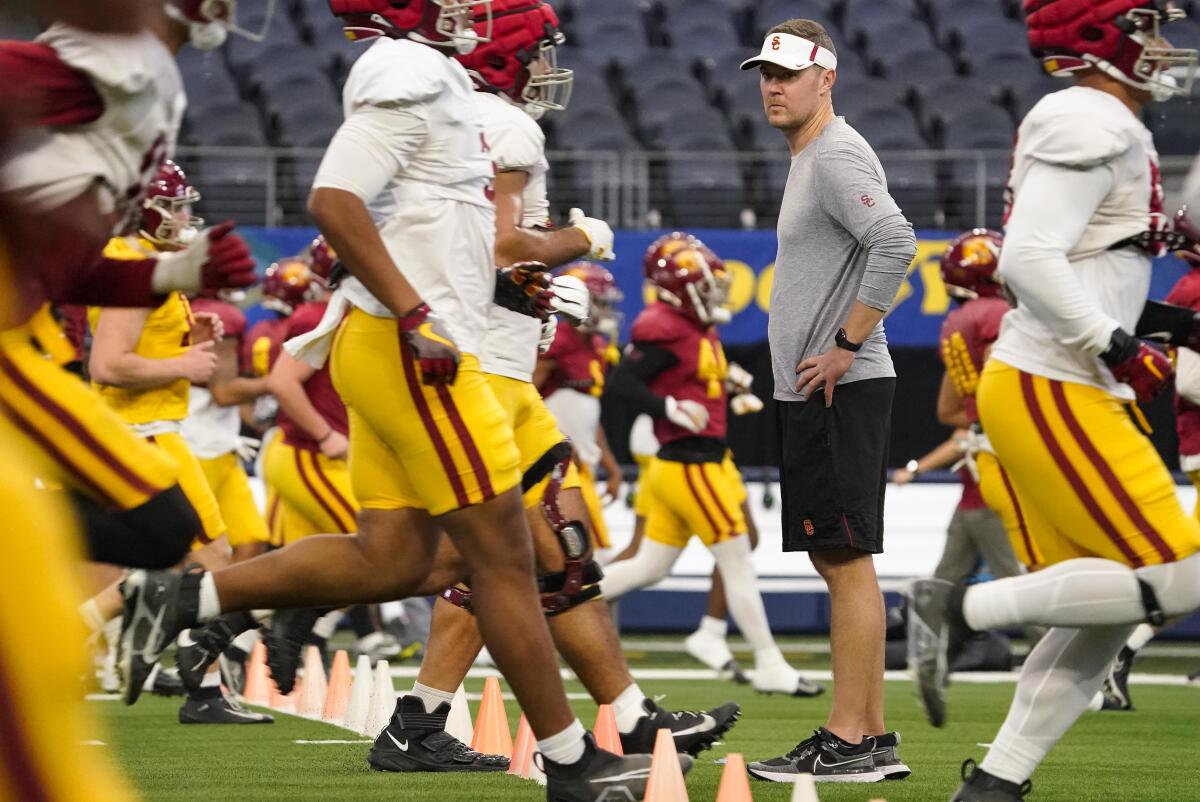
The Big Ten move was supposed to clearly reestablish USC as the top program on the West Coast. The only one, aside from UCLA, playing for conference championships against Ohio State and Michigan, the schools the Trojans used to meet in Rose Bowls.
In 2024, USC was supposed to be the one hosting the Wolverines at the Coliseum and traveling to Happy Valley in games that will go down in the sport’s annals signaling a new era. If Oregon and other Pac-12 schools are added to the mix for 2024, the entire schedule would surely have to be reconsidered, with the Ducks drawing their own marquee matchups.
Heck, would the Big Ten turn the West Coast teams into a pod, forcing them to play one another annually again? This fall’s USC-Oregon game at Autzen Stadium will possibly be the last non-postseason game between the schools, and I doubt many Trojans would lose much sleep over it.
Now, I should mention that none of this may happen. The Pac-12 could somehow survive. The Big Ten may prioritize angry ACC schools like Florida State before adding from the West again. But news like this is not often leaked in conference realignment without something real behind it.
Pac-12 commissioner George Kliavkoff’s reported presentation Tuesday to the Pac-12 presidents and chancellors of a potential media rights deal with Apple — heavy on streaming, not linear cable or broadcast — has opened the door to let chaos reign.
The Big Ten is likely to wait for the Pac-12’s demise to be furthered by Arizona and potentially Arizona State and Utah going to the Big 12. It’s absurd the Big Ten would think it can avoid looking like the predator that ate the Pac-12 now, after it took the L.A. schools, setting all of this in motion.
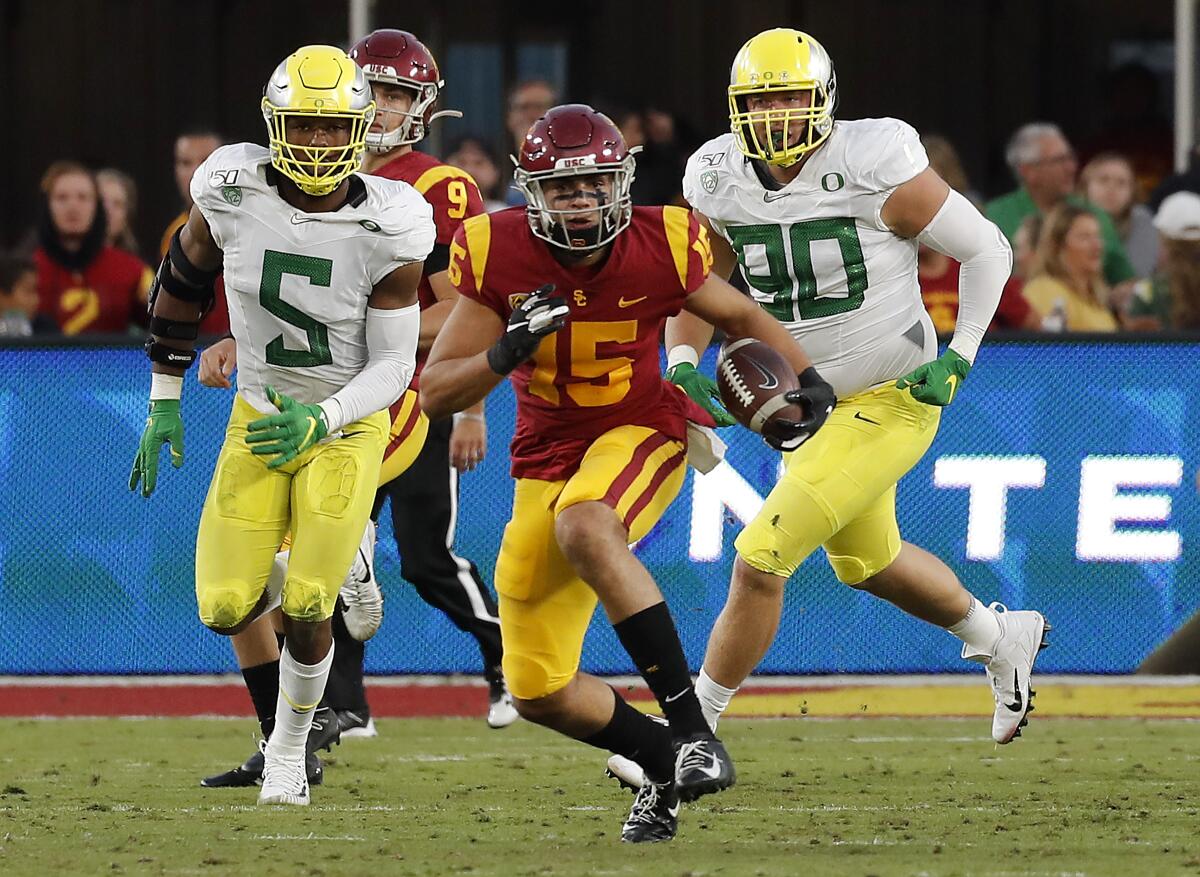
Last summer, it seemed feasible that the Pac-12 could live on with 10 schools and get a TV deal at least on par with the Big 12 and ACC. But Kliavkoff was outmaneuvered by his Big 12 counterpart, Brett Yormark, at every turn.
The Big Ten probably intended to follow through on USC’s wish of no Oregon. But the circumstances have changed. Oregon and Washington are now desperate enough for a life raft that they will certainly accept reduced shares from the Big Ten, while USC and UCLA enter at full shares.
Whatever difference there is between USC’s take and Oregon’s, Knight’s money can make up for it.
Even now, with Oregon unable to guarantee recruits a stable conference to play in, the Ducks are ranked No. 12 in 247Sports.com’s 2024 composite team rankings. USC is No. 13.
Oregon waddling around with a Big Ten swagger would be dangerous.
For USC and UCLA, Cal and Stanford would be much more palatable. The Bruins would love the Golden Bears joining to remove all awkwardness going forward with the UC Regents.
Fighting until the end after a kidney cancer diagnosis, UCLA defensive coordinator Bill McGovern and his family received some unexpected help along the way.
But the L.A. schools need to prepare themselves for Oregon and Washington now. USC and UCLA are not yet voting members of the Big Ten. They will be consulted, but they don’t have the authority to halt expansion. No Ducks! may fall on deaf ears.
The good news for USC is that Riley won’t give this potential development a second thought. He’s focused on turning the Trojans into a team that can beat Ohio State and Michigan, then Alabama and Georgia.
USC’s climb back to the top, however, unquestionably would become more arduous if the Big Ten indeed comes Duck calling.
More to Read
Go beyond the scoreboard
Get the latest on L.A.'s teams in the daily Sports Report newsletter.
You may occasionally receive promotional content from the Los Angeles Times.




